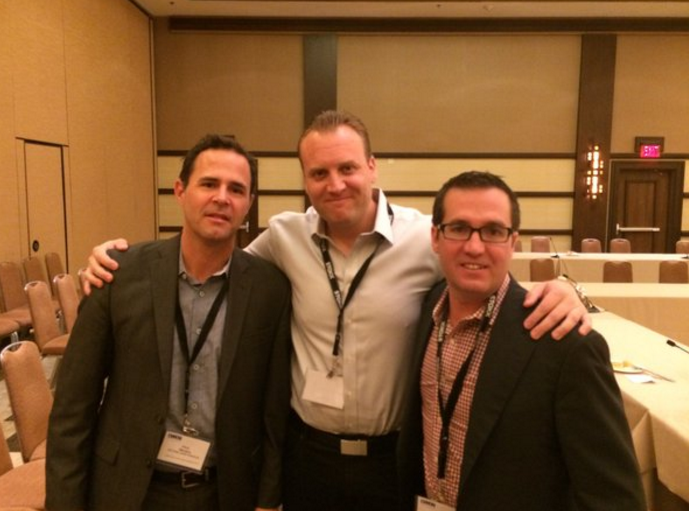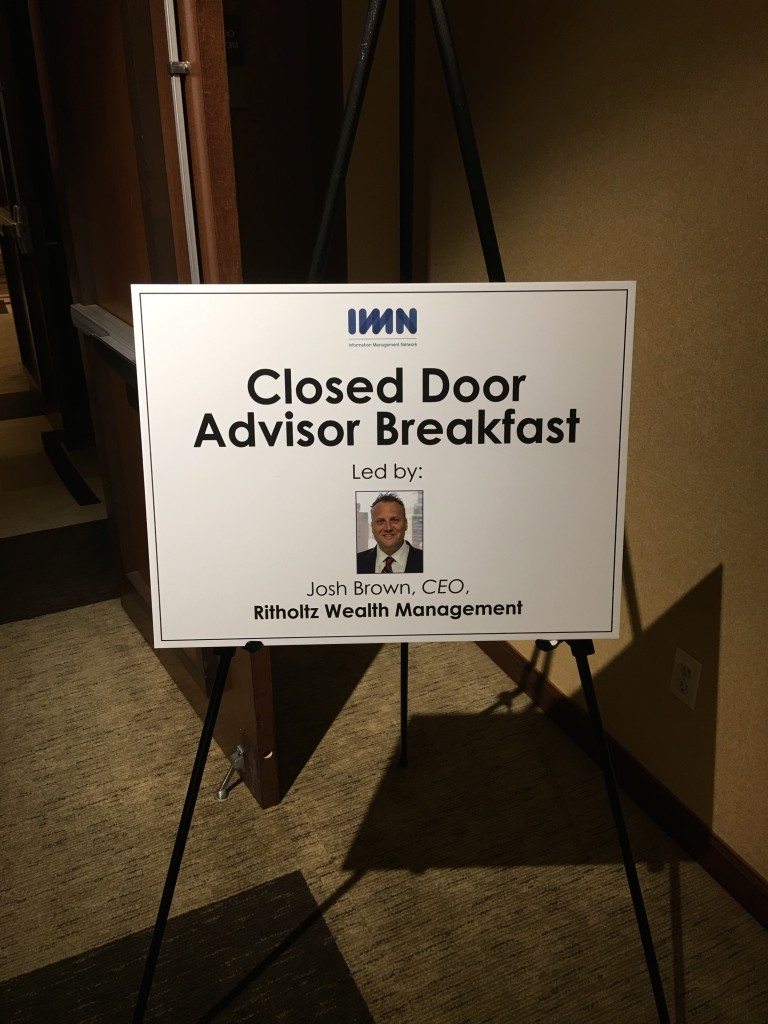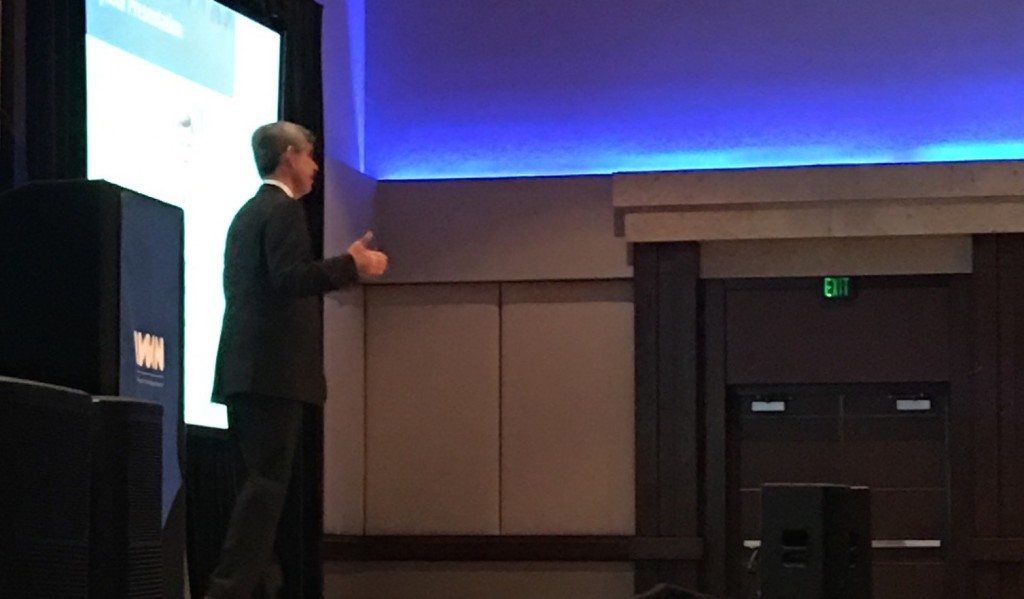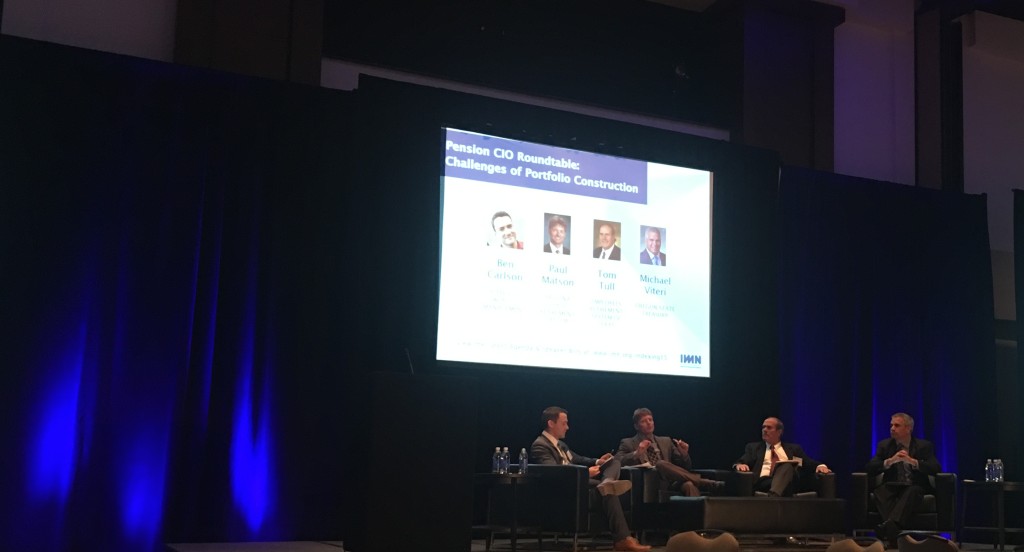I’ve jotted down some random thoughts and observations from my time here at the 20th Annual IMN Global Indexing and ETFs conference in Scottsdale. It’s been an incredible experience and I really picked up a lot about what’s going on in the industry. Some takeaways below in no particular order…
1. The audience for the conference is almost entirely RIAs or financial advisors. The fund companies, index companies and tech vendors to the industry are the sponsors who make the event possible. It’s a great experience to be able to spend time with people on both sides of the ball as we figure out the future together.
2. Robo-advice is confounding the industry, but not in the way you would expect. The crowd here is very curious about how to implement the technology; there isn’t any concern about the B2C robos as competitors. The prevailing feeling is that their AUM growth has already peaked while Vanguard and Schwab have stolen their thunder. Most attendees I’ve spoken with are frustrated by the fact that the existing tools for advisors to deliver automated advice are terrible. So far, FinTech has failed to deliver usable tools, on the whole. The front-end solutions (user interface) do not mesh well with the back-end systems advisors want to use. The administrative services offered by the software companies are laughable. There is little trust or confidence among advisors that any of the big custodian brokerages (Fidelity, Schwab, TD) have their acts together on this front. Rick Ferri led a panel discussion and the conclusion is that the advisor-operated robo-concept is not ready for prime time.
3. Speaking of Rick Ferri, he’s the best. I was really glad to have spent time with him this week. Rick is a pioneer in our space and he’s a really good businessman. I forgot to yell at him for not writing as much as he used to on his blog.

(hanging with my colleagues from around the nation – or, in this case, Canada!)
4. There was a panel about currency-hedged ETF strategies where things got somewhat contentious. Allan Roth, one of the smartest advisors I know, has publicly taken issue with the costs involved of currency-hedged investing. He repeated his arguments on the stage and then a guy in the audience who works for Deutsche Bank’s X-trackers ETF suite stood up and started arguing with him. You can understand why – that’s their product suite. The Deutsche guy said something to the effect of, “I just want to make sure the audience is aware that they are listing to misinformation right now.” The crowd was transfixed by the whole exchange.
Later that night, I had dinner with my friend Jeremy Schwartz of WisdomTree and Bloomberg’s ETF maven Eric Balchunas. We kicked around the issue and Jeremy keeps coming back to his premise that the decision to currency-hedge should be the default, with the decision not to hedge being the active bet. “Otherwise, you are buying the Euro along with the stocks, why would you actively want to do that?” I’m still on Roth’s side and unconvinced, although Jeremy did pay for dinner 🙂

5. My panel was a blast. I moderated a discussion on how advisors are using ETFs and the related challenges. Other than Blair duQuesnay, I had not met any of the other panelists before, but I got lucky – everyone on stage knew their stuff. The big takeaway from it was that advisors and their clients are not and never will be completely satisfied with being 100% passive to the benchmarks. Asset management – even if beginning at a passive baseline – has to deliver other benefits to be worthwhile. Another important topic was the fact that even the benchmarks themselves are not necessarily finished products or worthy of blind worship and fidelity. These are human constructs – not stone tablets handed down from Mount Sinai – and if you think you can do better in terms of portfolio allocation or implementation, you should try.

6. Mohamed El-Erian’s keynote was incredible. He talked for 45 minutes about happenings around the world and the biggest issues facing us for 2016. No teleprompter, no notes, no slides – just a masterful recounting of where we are and what lies ahead. He doesn’t say “ummm” even a single time or stumble on a single word. As someone who does a fair share of public speaking, I’m totally in awe. His views on the death of the debt-financed global growth model and our lack of a replacement growth model have been widely distributed so I won’t rehash it here. Suffice it to say that some of the most powerful and politically consequential people in the world read his stuff and you should too.
7. Smart beta discussions are now being treated with apathy rather than interest among my peers. We’re all factored out. The next stage is going to be mockery and derision – I’ve seen this movie before. Goldman’s new push into what it’s calling “ActiveBeta” is the punchline, arriving 2 years too late. No one thinks they’ll raise much money other than their own private client assets that they can push into these funds to seed them. Fidelity had their ETF people here, but their entrance to the market is still sometime in the future. No one thinks they’re going to do anything interesting unless maybe they compete on price for the advisors on their platform a la Schwab’s basically free index ETFs.
8. I’ll tell you what is the next hot thing – something called the ETMF. When someone mentioned the term to me I asked “Why would anyone want to buy an Exchange Traded Mother F***er?” No, he told me, it’s an Exchange Traded Managed Fund. The consensus here is that they’re going to be huge in 2016. Here’s why:
The biggest problem money managers are having is that they only make a lot of money on active strategies, which don’t work well in ETF packages, for the most part. A talented active manager running a mutual fund is able to disguise their buy and sell activity by simply filing a 13F of their holdings 45 days after the end of the quarter. That way, they can’t be front-run or picked off by competitors. ETFs, right now, are subject to daily transparency – this makes cloaking one’s portfolio moves impossible. After years of appealing to regulators for an exemption that will allow actively managed ETFs that do not divulge their daily trades, the last regulatory tackle has finally been broken. MFS is the first company to have figured it out. New entrants (NextShares) and existing fund companies (all of them) are now lining up and chomping at the bit to move their best funds into the ETMF wrapper. It solves lots of problems for the money manager and financial advisory complexes at the same time – interesting products, higher fees, better trading mechanism, etc. And if a few motherf***ers manage to jump on the bandwagon and create bad products, so be it.

9. It was very cool to see my colleague Ben Carlson moderate a discussion on institutional asset management with the investment heads from the Texas, Oregon and Arizona retirement funds. Pensions are increasingly adopting some of the best practices of private wealth managers when it comes to ETF use and an emphasis on not paying costs for what you’re not actually getting. Institutional asset management is a new business for us at Ritholtz Wealth and it’s amazing to have someone with Ben’s expertise heading it up for us.
10. I really enjoyed hanging out with Kevin O’Leary (Shark Tank), who has launched a suite of ETFs called OShares. Anyone who thinks he’s just a celebrity slapping his name on a product is sorely mistaken. He knows what he’s talking about and has serious public equity investing chops. He’ll be live with me from the Inside ETFs conference this January in Hollywood, Florida.
11. One last thing – Scottsdale itself is beautiful. Everything looks like it was built in the last 5 years. The town is immaculate, filled with cool bars and restaurants and the golf courses / swimming pools / hotels are gorgeous. I’m going to have open a branch out here.
That’s it from me. Headed back to NYC this afternoon. Adios, AZ!




… [Trackback]
[…] Info on that Topic: thereformedbroker.com/2015/12/08/scenes-from-the-future-of-wealth-management/ […]
… [Trackback]
[…] Find More Info here on that Topic: thereformedbroker.com/2015/12/08/scenes-from-the-future-of-wealth-management/ […]
… [Trackback]
[…] Read More on that Topic: thereformedbroker.com/2015/12/08/scenes-from-the-future-of-wealth-management/ […]
… [Trackback]
[…] Information to that Topic: thereformedbroker.com/2015/12/08/scenes-from-the-future-of-wealth-management/ […]
… [Trackback]
[…] Find More on on that Topic: thereformedbroker.com/2015/12/08/scenes-from-the-future-of-wealth-management/ […]